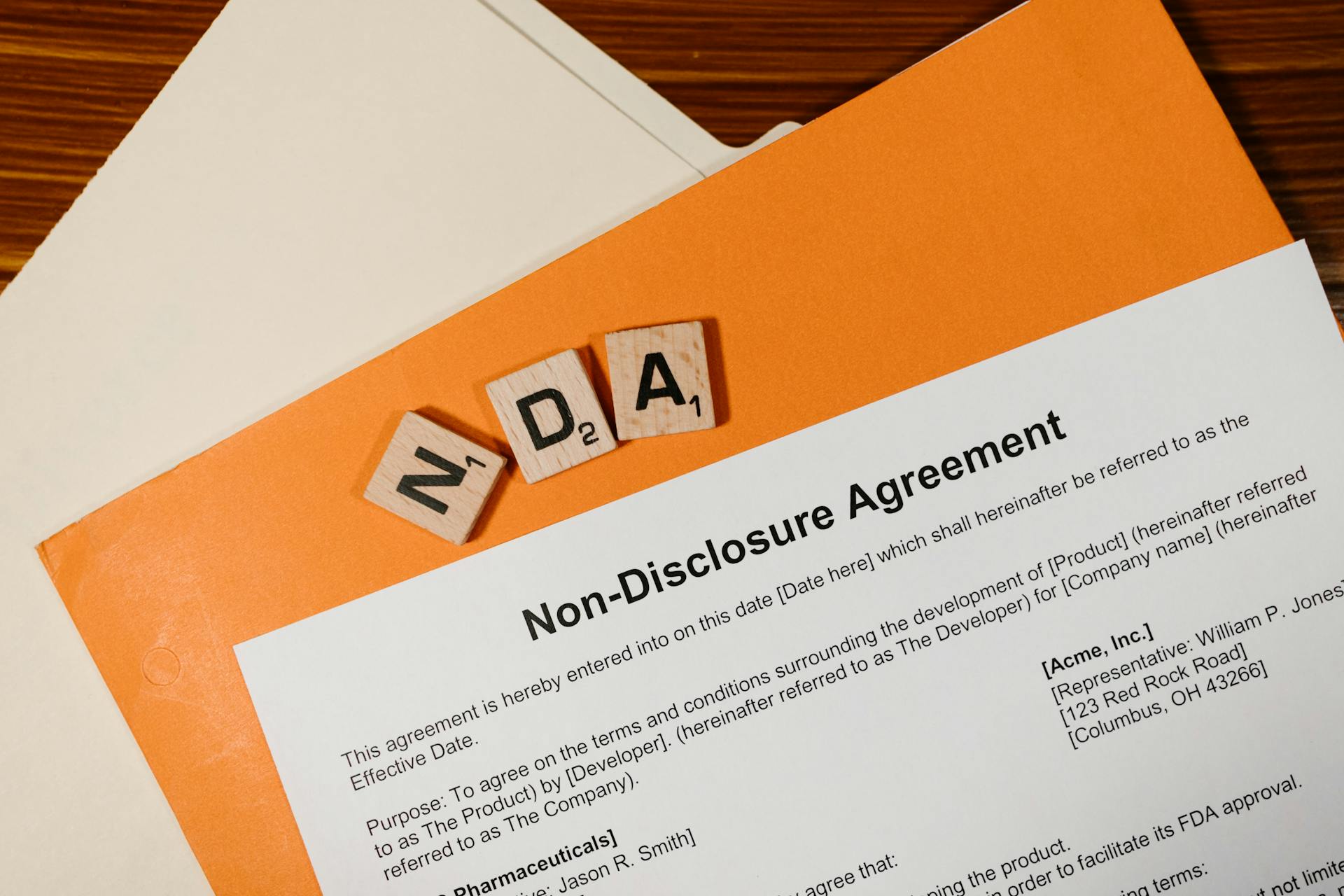
Small healthcare organizations often struggle to comply with HIPAA regulations, but it's not impossible. With the right mindset and a few key strategies, you can ensure your organization is HIPAA compliant.
First, it's essential to understand that HIPAA applies to any organization that handles protected health information (PHI). This includes not just hospitals and clinics, but also pharmacies, dental offices, and even some types of mobile health apps.
To start, designate a HIPAA compliance officer to oversee your organization's compliance efforts. This person will be responsible for ensuring that all employees understand their roles and responsibilities in protecting PHI.
In the next section, we'll dive deeper into the specific requirements for HIPAA compliance, including the types of PHI that must be protected and the procedures for handling patient requests for access to their records.
Take a look at this: Hipaa Examples of Internal Threats Affecting Phi Include
Understanding HIPAA Basics
HIPAA sets national privacy and security standards for safeguarding protected health information (PHI). PHI is any demographic information that can be used to identify a patient.
Explore further: Billing Information Is Protected under Hipaa
The three main components of HIPAA are the Privacy Rule, Security Rule, and Breach Notification Rule. These rules address different aspects of protecting patient information, including individual rights, administrative safeguards, physical security measures, and breach reporting protocols.
Protected health information (PHI) includes medical histories, insurance information, test results, payment information, and demographic data. If your business comes into contact with any information that relates to a person's healthcare, treatment, or coverage, it's considered PHI and is protected under the HIPAA law.
Here are the key elements of PHI:
- Name
- Email address
- Phone number
- Home address
- Financial information
- Insurance ID number
- Social Security number
- Medical record
It's essential to understand that PHI stored in an electronic format is known as ePHI, and must be protected in the same manner as PHI.
For more insights, see: What Information Does Hipaa Protect
Protecting Physical Documents
Protecting physical documents is crucial to maintaining patient confidentiality. Ensure that all paper files containing patient information are stored securely in locked cabinets or rooms accessible only to authorized personnel.
Keep in mind that physical documents still play a role in many practices, so it's essential to implement strict policies and procedures regarding document disposal. This includes shredding confidential papers rather than simply discarding them in regular waste bins.
Recommended read: Physical Safeguards Are Hipaa
Safeguard Physical Documents
Physical documents, like paper files, still hold a place in many practices, so it's crucial to keep them secure. Ensure that all paper files containing patient information are stored in locked cabinets or rooms.
Locking up physical documents is a simple yet effective way to safeguard them. Implement strict policies and procedures regarding document disposal, including shredding confidential papers rather than simply discarding them in regular waste bins.
Physical documents can be easily misplaced or stolen if not handled properly. Store them in a secure location, accessible only to authorized personnel.
For more insights, see: How to Stop Getting Paper Bank Statements
Check Your Fax
As a healthcare provider, you may need to send sensitive information via fax, but this can be a risk to your HIPAA compliance if not done properly.
Confirming the fax number you're sending to is correct is crucial. Many organizations pre-program their fax systems with frequently used fax numbers to minimize the risk.
Storing your fax machine in a secure location is an additional safeguard. This can help prevent unauthorized access to sensitive information.
Securely filing and disposing of faxes according to HIPAA guidelines is also essential. This includes implementing a process for verifying the accuracy of fax numbers before sending sensitive information.
A fresh viewpoint: Are Invoices Considered Private Information Hipaa
Password and Device Security
Password and Device Security is a critical aspect of HIPAA compliance. Make sure you create strong passwords using a minimum of 8 characters, avoiding sequential characters, repeated characters, or easily guessable phrases. Passwords should never expire but must be changed if compromised.
Limiting who has access to your systems and their information is also essential. This can be achieved by implementing strong access controls and limiting user privileges.
Implementing strong anti-virus software, setting up a firewall, and using data encryption, especially for mobile devices and email, are all important measures to secure your computer systems.
To further enhance security, consider layering up the authentication process with other secure access and authentication controls. This can be done by implementing a strong password and username combined with a one-time password or security token.
Requiring multifactor authentication is also a best practice. This involves requiring users to provide two or more verification factors to gain access to resources such as an online account or virtual private network (VPN).
For your interest: Discover Card 2 Factor Authentication
Here are some key security measures to implement:
- Limit access to systems and information
- Implement strong anti-virus software
- Set up a firewall
- Use data encryption for mobile devices and email
- Require multifactor authentication
Remember, password protection is your first line of defense against unauthorized access to electronic health records (EHRs) or other sensitive systems.
Online Security and Monitoring
Online security and monitoring are crucial aspects of HIPAA compliance. You need to be mindful of email communication, as sending sensitive patient information via regular email is a significant HIPAA violation.
Use secure email services that offer end-to-end encryption, ensuring that only the intended recipient can access the message contents. Always verify the recipient's email address before sending any confidential information.
Social media use can also pose a risk, as organizations subject to HIPAA compliance may not publish or share any protected health information via social media, unless they have received written authorization to do so.
Businesses must take extra caution when responding to queries, reviews, or feedback in the public domain, as a single mistake can result in a significant fine, like the $50,000 fine issued against a dental practice in 2022.
For more insights, see: Hipaa Email Rules
To secure your information technology, limit who has access to your systems and their information, implement strong anti-virus software, set up a firewall, and use data encryption, especially for mobile devices and email.
Here are some key measures to secure your information technology:
- Limiting who has access to your systems and their information
- Implementing strong anti-virus software
- Setting up a firewall
- Using data encryption (especially for any mobile devices and email)
- Requiring your staff to change their passwords frequently
- Forcing a terminal to log off when it has been idle for several minutes
Make sure your electronic health record (EHR) software comes from a reliable vendor and is certified by the Office of the National Coordinator for Health Information (ONC).
Password protection is your first line of defense against unauthorized access to electronic health records (EHRs) or other sensitive systems. Create strong passwords, using a minimum of 8 characters, and avoid using sequential characters or easily guessable phrases.
You might like: Hipaa Covers Which of the following Electronic Transactions
Keep Software Updated
Keeping your software up-to-date is crucial for staying HIPAA compliant and reducing security vulnerabilities. It's like patching holes in a fence to keep intruders out.
Regularly checking for software updates is a must, and you should install security updates and patches on all devices used to access patient information as soon as they become available. This will help close the door on security threats like malware.
On a similar theme: Most Video Conferencing Software Is Hipaa Complaint.
Software companies often announce "end-of-support" for older versions, which means they no longer provide updates, bug fixes, or technical support. This creates a significant vulnerability in terms of security risks.
To ensure consistent compliance, businesses should either download and install patches as soon as they are available, opt-in for automatic updates, or switch to software that provides support and updates aligned with the changing HIPAA legislation.
Here are some key points to consider when keeping your software updated:
- Regularly check for software updates and install security updates and patches on all devices used to access patient information.
- Be aware of "end-of-support" announcements from software companies and take action to address them.
- Consider opting-in for automatic updates or switching to software that provides support and updates aligned with HIPAA legislation.
By following these steps, you'll be well on your way to keeping your software up-to-date and staying HIPAA compliant.
Reporting and Auditing
Reporting suspicious activity is crucial to maintaining HIPAA compliance. Report any potential breaches immediately to your organization's designated HIPAA privacy officer or compliance team.
Early detection and prompt reporting can prevent further damage and ensure appropriate actions are taken promptly. This is why vigilance is key in maintaining HIPAA compliance.
Conducting self-audits is also essential to ensure your practice is HIPAA compliant. Periodic internal audits help assess the security measures you've put in place.
A fresh viewpoint: Hipaa Report
Report Suspicious Activity
Reporting suspicious activity is crucial to maintaining HIPAA compliance. Every employee should be vigilant and report any potential breaches or suspicious activity immediately.
Your organization's designated HIPAA privacy officer or compliance team should be the first to know about any suspicious activity. They will take prompt action to prevent further damage.
Early detection is key to preventing further damage. Reporting suspicious activity promptly ensures that appropriate actions are taken.
All employees, including leadership, should be trained to recognize and report suspicious activity. This is essential for maintaining HIPAA compliance.
Reporting suspicious activity is a critical step in maintaining HIPAA compliance. It's a team effort, and every employee plays a vital role in preventing breaches.
If this caught your attention, see: Hipaa Breach Definition
Conduct Self Audits
Conducting self-audits is essential to ensure your practice is compliant with HIPAA regulations. Just as you take steps to ensure quality care, you should also perform periodic internal audits of your HIPAA compliance.
You should assess the security measures you've put in place. This includes reviewing your procedures for handling protected health information (PHI) and ensuring they align with HIPAA standards.
Regular self-audits help you identify areas for improvement and make necessary adjustments to maintain compliance. This proactive approach can save you from costly fines and reputational damage down the line.
A unique perspective: Hipaa Self Assessment
Frequently Asked Questions
What are the three 3 rules of HIPAA?
The three main rules of HIPAA are: confidentiality, integrity, and availability. These rules ensure the protection of sensitive patient information against unauthorized use, tampering, and loss.
What is the golden rule of HIPAA?
The Golden Rule of HIPAA is to treat others' sensitive health information with the same respect and care you would want for your own. This principle guides HIPAA compliance and ensures patient data is protected with integrity and confidentiality.
What is the most common way HIPAA is violated?
According to HHS' Enforcement Highlights report, the most common way HIPAA is violated is through impermissible uses and disclosures of protected health information (PHI). This often occurs when sensitive patient data is shared or accessed inappropriately.
Sources
- https://compliancy-group.com/hipaa-compliance-tips-for-employees/
- https://scytale.ai/resources/10-go-to-tips-for-hipaa-compliance/
- https://compliancy-group.com/hipaa-tips-how-to-create-an-effective-compliance-program/
- https://www.medicaleconomics.com/view/five-tips-for-maximizing-data-security-and-ensuring-hipaa-compliance
- https://www.schellman.com/blog/healthcare-compliance/hipaa-compliance-tips-for-small-healthcare-providers
Featured Images: pexels.com

